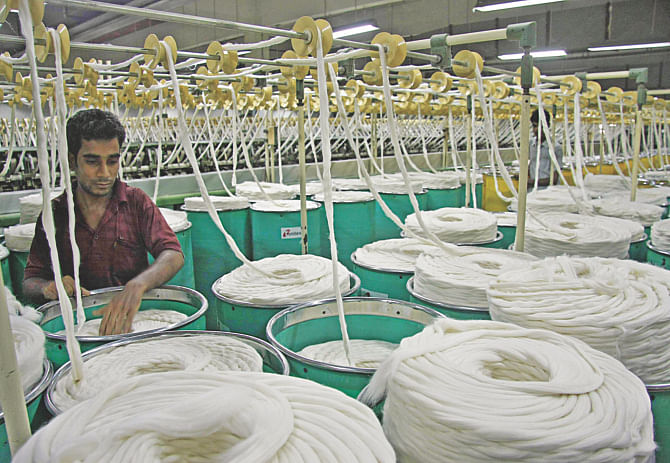Bonded warehouse: a cotton solution
Bonded warehouse: a cotton solution

As the growth in the garment sector continues, the demand for yarn in both quality and quantity has increased as well. But the local spinning sector is lagging and cotton procurement is a big area of concern.
Because of the long shipment time from origins such as Africa, North America, most local spinners are forced to stick to Indian and Pakistani cotton. However, such cotton lacks quality, contains high moisture and is often contaminated.
The cotton shippers in India and Pakistan only export residual substandard cotton as the top crop is always picked and consumed by their respective local spinners.
These local spinners have the means to only procure cotton, which is subject to 100 inspections—payment upon physical inspection—and not on a description.
This year even though West African cotton offers a far better price and quality than Indian cotton, very few mills are able to capitalise on it. A long shipment time—6 to 10 weeks on average—requires a bloated and difficult working capital.
Instead of one month's worth of cotton, mills have to have three months of working capital tied up just in the cotton procurement pipeline.
It is evident that it is unrealistic for most mills to function in such manner, and often mills are left to negotiate with local cotton and forced to work in local markets rather than the higher paying export demand.
It is an unsustainable operation and our textile mills will face challenges to survive from international competition.
A possible solution is bonded warehouse facility, a government-provided service that allows merchants to bring and store their products within the sovereign nation's land with the right to re-export it at their discretion.
It provides a revenue stream in storage charges for the government and gives local consumers a purchase advantage by bringing the cotton closer to their requirements and consumption needs.
Bonded warehouses for cotton will allow a merchant to bring cotton and store it in a warehouse within Bangladesh territory, ready to be sold to local spinners. They would also be allowed to re-export cotton from the port to other origins free of export cost.
Such a system is already in use in China which is another large net importer. The warehouses provide a continued revenue source for the government and allow cotton procurement from their doorstep.
It is simply like opening a retail store for the merchants. A similar facility is available via Port Kelang Malaysia, but is used by selected merchants such as Olam and Cargill, at a limited capacity.
If a similar facility is offered in Bangladesh, it will give them a more competitive location, considering the vicinity of other South Asian cotton importing countries such as India and Pakistan.
BENEFITS
Warehouses as such will allow spinners to buy cotton at their doorstep, negating the huge risks of incurring losses due to long shipment times. The time lag between an actual purchase today for a local spinner and collection of said purchases at their mills can vary from two weeks from India, Pakistan to up to 12 weeks for cotton sourced from the USA, West Africa and Latin America. And that's excluding shipment delays.
This lag exposes the spinner to huge market volatility, as cotton prices can fluctuate drastically between purchase and use. An access to future markets is the only way for the local spinners to hedge such risks.
Bonded warehouses will allow spinners to insure quality prior to purchase. A spinner can draw full sample prior to purchase from the cotton warehouse and insure their purchase quality and deter merchants from selling a lower quality.
Currently, quality is a big factor as once purchase is made, a spinner is at the merchants' mercy. Often a spinner is forced to accept lower quality cotton as the International Cotton Association's means of quality compensation is rigid and biased in favour of the shippers, who still dominate the terms of the trade.
Spinners will also be able to take better decisions related to raw cotton procurement.
It will protect the spinner in a bearish market. In 2010-11, the entire industry suffered a huge loss as cotton prices drastically rose and fell, leaving spinners with expensive cotton whose procurement cost they could not meet, as yarn price had fallen.
It will negate the need for the spinner to hedge their risks as the merchants would bear the hedging risks and market risks and with a limited lead time, the spinner is not exposed as dramatically to cotton price movements.
Insurance is of key concern, and merchants would prefer international insurance be allowed from reputed firms. Warehousing and transport facilities for their cotton should be stored along with monitoring to insure such a venture is not misused.
The writer is a spinner.